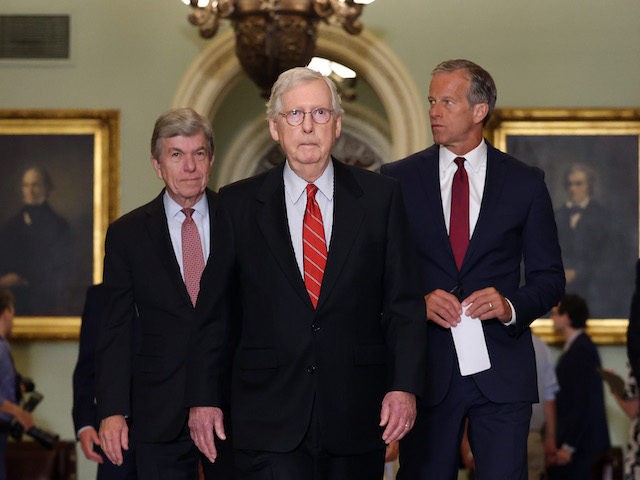Senate Republicans are already walking away from the infrastructure deal Friday over its expense, as President Joe Biden ties the measure to a separate reconciliation tactic full of far-left items.
“GOP senators are also concerned that they may get tied to the larger reconciliation package if they give Democratic moderates political cover by joining with them to pass the bipartisan infrastructure proposal,” the Hill reported.
Senate Minority Leader Mitch McConnell said Thursday Biden’s strategy of passing a bipartisan deal tied to a reconciliation package, which is filibuster immune, puts Senators, “who were optimistic about doing a bipartisan infrastructure bill, in the position of our Democratic friends having to guarantee that the 2017 tax bill is unwound.”
“That’s our one red line,” he added.
But there is another reason. “Several GOP senators are questioning a provision that would provide $40 billion to beef up IRS enforcement, which is expected to generate an estimated $100 billion in new revenue that can be spent on infrastructure,” the Hill reports.
A Republican Senator told the Hill, “There were points of inquiry. There are a few areas where, if we’re saying we’re going to pay for this, we want to make sure we’re really paying for it.”
“There were some good questions about whether this or that pay-for is an area where we’re being too ambitious,” he reasoned.
Sen. Rand Paul (R-KY) also expressed concern over the bill’s expense and how to pay for it, which he said could be generated from the savings of shifting resources home from Afghanistan.
“The question is how we pay for it. I’ve been asking, where’s the $50 billion we save a year in Afghanistan? Where’s the savings?” he explained. “That’s how I’d pay for something like this. I’d quit spending it in Afghanistan and spend it here. If we had a pay-for like that it would go further to convincing me.”
Meanwhile, during Thursday’s press conference, Biden acknowledged he might not have the votes to pass the bipartisan measure, understanding radical Democrats have already suggested they would oppose the bill due to the exclusion of far-left items.
Alexandria Ocasio-Cortez (D-NY) said Thursday she opposes the bipartisan deal which would need House approval after being passed in the Senate:
The diversity of this “bipartisan coalition” pretty perfectly conveys which communities get centered and which get left behind when leaders prioritize bipartisan dealmaking over inclusive lawmaking (which prioritizes delivering the most impact possible for the most people)
Sen. Alex Padilla (D-CA) said shortly after the deal was agreed upon that “This bipartisan deal, it’s not enough. It doesn’t meet the moment.”
Sen. Ron Wyden (D-OR) also stated he was “not willing to support throwing climate overboard.”
In another tweet which has since been deleted, Wyden added “he wants an assurance the bipartisan package tied to any larger reconciliation bill.”
House Speaker Nancy Pelosi (D-CA) backed up Wyden’s assurances Thursday by saying “there will be no infrastructure bill unless we have a reconciliation bill.”
The plan details $579 billion in total new spending with $312 billion for transportation, and $266 billion for other traditional infrastructure items.
The reported items of the deal include:
- Reduce the IRS tax gap
- Unemployment insurance program integrity
- Redirect unused unemployment insurance relief funds
- Repurpose unused relief funds from 2020 emergency relief legislation
- State and local investment in broadband infrastructure
- Allow states to sell or purchase unused toll credits for infrastructure
- Extend expiring customs user fees
- Reinstate superfund fees for chemicals
- 5G spectrum auction proceeds
- Extend mandatory sequester
- Strategic petroleum reserve sale
- Public private partnership, private activity bonds, direct pay bonds, and asset recycling for infrastructure investment
- Macroeconomic impact of infrastructure investment

COMMENTS
Please let us know if you're having issues with commenting.